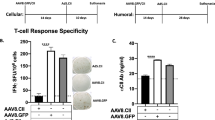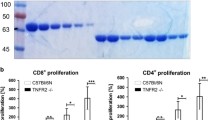Abstract
Collagen type II-induced arthritis (CIA) in DBA/1 mice can be passively transferred to SCID mice with spleen B- and T-lymphocytes. In the present study, we show that infection ex vivo of splenocytes from arthritic DBA/1 mice with a retroviral vector, containing cDNA for the soluble form of human p75 receptor of tumour necrosis factor (TNF-R) before transfer, prevents the development of arthritis, bone erosion and joint inflammation in the SCID recipients. Assessment of IgG subclass levels and studies of synovial histology suggest that down-regulating the effector functions of T helper-type 1 (Th1) cells may, at least in part, explain the inhibition of arthritis in the SCID recipients. In contrast, the transfer of splenocytes infected with mouse TNF-α gene construct resulted in exacerbated arthritis and enhancement of IgG2a antibody levels. Intriguingly, infection of splenocytes from arthritic DBA/1 mice with a construct for mouse IL-10 had no modulating effect on the transfer of arthritis. The data suggest that manipulation of the immune system with cytokines, or cytokine inhibitors using gene transfer protocols can be an effective approach to ameliorate arthritis.
Similar content being viewed by others
Author information
Authors and Affiliations
Rights and permissions
About this article
Cite this article
Mageed, R., Adams, G., Woodrow, D. et al. Prevention of collagen-induced arthritis by gene delivery of soluble p75 tumour necrosis factor receptor. Gene Ther 5, 1584–1592 (1998). https://doi.org/10.1038/sj.gt.3300785
Received:
Accepted:
Published:
Issue Date:
DOI: https://doi.org/10.1038/sj.gt.3300785
- Springer Nature Limited
Keywords
This article is cited by
-
Lentiviral vector-mediated stable expression of sTNFR-Fc in human macrophage and neuronal cells as a potential therapy for neuroAIDS
Journal of Neuroinflammation (2011)
-
Immunosuppressive effects of mesenchymal stem cells in collagen-induced mouse arthritis
Inflammation Research (2010)
-
Inhibition of glycogen synthase kinase‐3β attenuates the development of carrageenan‐induced lung injury in mice
British Journal of Pharmacology (2006)
-
Protection of human cerebral neurons from neurodegenerative insults by gene delivery of soluble tumor necrosis factor p75 receptor
Experimental Brain Research (2005)
-
Gene therapy for arthritis
Gene Therapy (2003)




